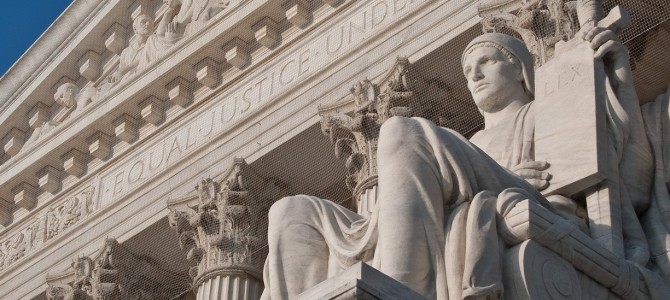
On any given day a list of Big Progressivism’s most dangerous enemies would include the usual politically-incorrect suspects: entrepreneurs, independent thinkers, devout Christians, and trigger-word citizens and organizations. But if the latest exposé on Samuel Alito is any indicator, we can expect Samuel, Clarence, Antonin, John, and perhaps even Anthony to jump to the top of the list in the next few months.
What gives with Alito? More like, “Where’s Alito?” In true fifth-grade fashion, the NYT’s Linda Greenhouse reports that he’s the least recognizable conservative of the Roberts bloc (“I doubt if one American in a thousand could pick him out of a lineup.”)
What’s Justice Alito thinking? Apparently he’ll have to do better than letting down his (Philadelphia) sports-fan guard in an American Spectator profile. Justice Kagan allowed People Magazine to document her more human side, which included divulging SCOTUS’s hazing of “junior” justices. While not the stuff of Pulitzer Prizes, this was reporting at its best, a revealing look at how the youngest judge made friends on the court and learned to hunt with Justice Scalia. Justice Sotomayor perhaps did Alito and Kagan one better still when her budding friendship with J-Lo enabled Elle, US, and PopSugar to highlight the diva’s shepherding of Justice Sotomayor’s journey into the spotlight. Justice Scalia, however, may be the only justice with a voice that could give J-Lo the “Goosies.”
American Idol-status aside, the list of alarming charges Greenhouse emits later in her article includes Justice Alito’s willingness to headline Federalist Society events; his consistent and reliable jurisprudence that has made him popular among conservatives; his willingness to hear legal challenges to public union coercion, but most dangerously of all, his predilection, in his own words, for paying deference to “the standards of the American people — not the standards of professional associations, which at best represent the views of a small professional elite.”
Does anything of the sort amount to justices behaving badly?
Progressives, despite their complaints, have dominated the Supreme Court for seventy-five years (since the “switch in time that saved nine”), as the legal realism that early Progressive Oliver Wendell Holmes, Jr., pioneered went mainstream and then came to dominate the legal establishment. Offering a radical rejection of nature as the guiding source for legal judgment, Holmes left his readers (and, eventually, his nation) without any ultimate basis for resolving judicial questions: law was only the threats of the powerful reduced to technical language. That made judges mere partisans, for or against the ruling class judgment. When judges acted accordingly, the legal realists completed the circle by declaring that judges had always been partisans, but were now free from the obligation to pretend otherwise.
But if judges are only partisans, as every mainstream media analysis of the Supreme Court today assumes, just how far should a free people be bound by their judgment? Abraham Lincoln’s response to the Dred Scott v. Sandford (1857) decision provides a helpful answer. There are two parts to every court decision: the judgment and the reasoning. The rule of law demands, Lincoln argued, that the particular judgment of the case be respected by all. Dred Scott lost his case, much to Lincoln’s regret, but that part of the matter had to stand, once the final appeal to the Supreme Court was exhausted. The reasoning of the Court majority, rife with historical and interpretive errors and partisan judgments, however, need not be regarded as conclusive by the president, the Congress, or the people at large.
What was true of the reasoning in the grossly unjust Dred Scott ruling is true of every instance of Holmes-inspired, living Constitution jurisprudence since.
Federalist 78, even more than Chief Justice Marshall’s monumental Marbury v. Madison (1803) decision, establishes the moral and legal basis for judicial review, the power of the courts to declare legislative and executive acts unconstitutional.
In the context of justifying the “good behavior” tenure of judges, Alexander Hamilton argues that judicial independence is especially critical under “a limited Constitution.” He explains:
By a limited Constitution, I understand one which contains certain specified exceptions to the legislative authority; such, for instance, as that it shall pass no bills of attainder, no ex-post-facto laws, and the like. Limitations of this kind can be preserved in practice no other way than through the medium of courts of justice, whose duty it must be to declare all acts contrary to the manifest tenor of the Constitution void. Without this, all the reservations of particular rights or privileges would amount to nothing.
Hamilton defends this claim in the paragraphs that follow, demonstrating that the case for judicial review depends upon a series of essential premises denied by Progressivism.
The first objection he considers is one grounded in a mistaken understanding of the separation of powers. If the courts can declare laws unconstitutional, doesn’t that make them superior to the Congress? No, answers Hamilton. It only means that both are subject to the Constitution–which is to say that “the power of the people is superior to both.” Why prefer the people’s Constitution to the legislator’s law: because of the “nature and the reason of the thing,” Hamilton argues–the “prior act of a superior ought to be preferred to the subsequent act of an inferior and subordinate authority.”
We are accustomed to hearing that the government is meant to serve the people–that the people are the master of our system. It is critical, however, to note where and how that mastery is expressed: in the Constitution, not the latest opinion polls or election results. There is no room in Hamilton’s system for a Progressive-style “living Constitution,” evolving with changes of elite or popular opinion to suit the prejudices of the day. The Constitution would cease to be a “prior act” if it were not fixed in meaning by those who established it, the people who participated in the ratification process in 1787 and 1788.
But it is the “nature and reason of the thing,” more than Hamilton’s particular verbiage, that excludes a Progressive justification of judicial review. The Constitution itself is an instance of the natural right of a people, proclaimed in the Declaration of Independence, “to institute new government, laying its foundation on such principles, and organizing its powers in such form, as to them shall seem most likely to effect their safety and happiness,” through the preservation of their “unalienable rights.” Such a government, the Declaration further proclaims, derives “its just powers from the consent of the governed.” That’s why the judiciary can’t turn a blind eye to an unconstitutional act by the legislature or executive: to do so would make it a party to injustice and, in a self-defeating way, undermine its claim to its otherwise legitimate political authority.
Judicial review, then, is a necessary part of a constitutional system built upon the self-evident truths of the Declaration of Independence. But Progressive legal philosophy has no place for those or any other such truths and can therefore find no justification for annulling state or federal laws in the founders’ defense of judicial review. What then?
Mystic appeals to History or the “mystery of human life” might fill the rhetorical hole in the Progressive argument, but there is no substitute reasoning for judicial review within the bounds of republican principles. An appeal beyond the Constitution to Justice itself, defended, at least in part, by Hamilton in Federalist 78, still requires a natural order of things–exactly what Holmes and his acolytes deny. Let the Progressive judges, then, truly be realists and tell us: we judge so, because we wish it so–and we believe we have the power to make our wishes stick.
Hamilton anticipated such an abuse of judicial review, the exercise of “will” in the place of “judgment,” but considered it an unavoidable danger, short of abolishing judicial power, and politically improbable, given the weakness of the judiciary.
Progressivism has made the improbable not just probable, but necessary, so long as it controls five Supreme Court votes and enough political power to vindicate them.
What does that mean for the three most important cases of the upcoming term?
A Progressive’s dream scenario would amount to the Roberts Court:
-
Upholding the Obama Administration’s decision to provide health care subsidies to individuals in states that did not set up their own Obamacare “exchange,” contrary to the “manifest tenor” of the law–ruling, in essence, that the executive branch can spend money the legislative branch has not appropriated, contrary to the “manifest tenor” of the Constitution.
-
Positing a constitutional right to same-sex marriage, which would thereby strike down bans still in effect in fourteen states and provide another victory for the assailants of the natural order of things.
-
Getting back into the business of regulating political speech by upholding a Florida campaign finance law particular to judicial campaigns.
Such a series of judgments would reinforce the trend that one’s adherence to Progressivism rather than constitutionalism is the standard of “good behavior,” making all the “concrete difference” in the world in the further pragmatic unraveling of the American legal regime. Let’s hope instead that the Roberts Court chooses constitutional judgment over Progressive will.









